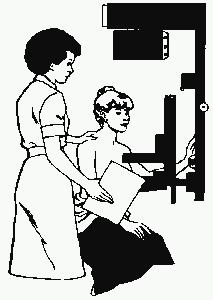The American College of Obstetricians and Gynecologists (ACOG) recently reversed their earlier recommendation to women in their 40s about having screening mammograms every one to two years and beginning annual screenings at age 50.
 ACOG now supports an annual screening mammography beginning at age 40 for women with an average risk of developing breast cancer.
ACOG now supports an annual screening mammography beginning at age 40 for women with an average risk of developing breast cancer.
The ACOG feels that the development of breast cancer in younger women warrants annual mammograms given that among women in their 40s, a small asymptomatic tumor progresses to symptomatic cancer within 2.0 to 2.4 years, as compared with 4.0 to 4.1 years for women ages 70 to 74, they wrote.
“Although women in their 40s have a lower overall incidence of breast cancer compared with older women, the window to detect tumors before they become symptomatic is shorter, on average,”stated Jennifer Griffin, MD, University of Michigan in Ann Arbor, the new guideline co-author. “If women in their 40s have annual mammograms, there is a better chance of detecting and treating the cancer before it has time to spread than if they wait two years between mammograms,” she added.
Two years ago theU.S. Preventive Services Task Force (USPSTF) advised women younger than 50 to review the potential benefits and harms of screening mammography with their physicians before deciding on a course of action. The task force went on to recommend biennial rather than annual mammograms.
Multiple organizations, elected officials and breast cancer survivors took exception to and continue to be against the USPSTF guidelines for scheduling screening mammograms.
The American College of Obstetricians and Gynecologists new guideline now brings it in line with other organizations such as the American Cancer Society and the National Comprehensive Cancer Network, which both recommend annual mammograms beginning at age 40.
The new ACOG guideline advises physicians, when suggesting annual screenings to women at 40, to also educate them as to the value of the test and the possibility for false-positive and false-negative results. Women also need to be told about the potential need for additional imaging or biopsies based on screening results of their mammograms.
 ACOG now supports an annual screening mammography beginning at age 40 for women with an average risk of developing breast cancer.
ACOG now supports an annual screening mammography beginning at age 40 for women with an average risk of developing breast cancer.
